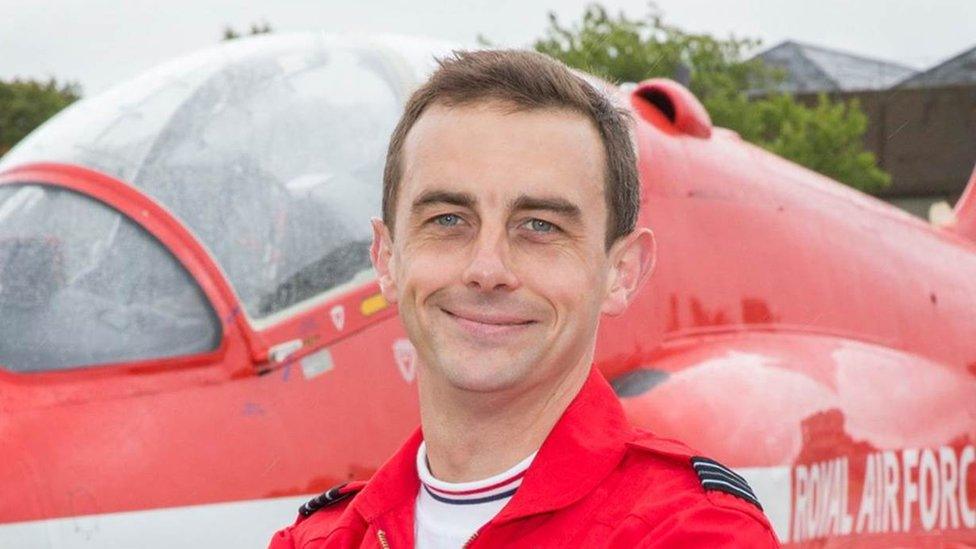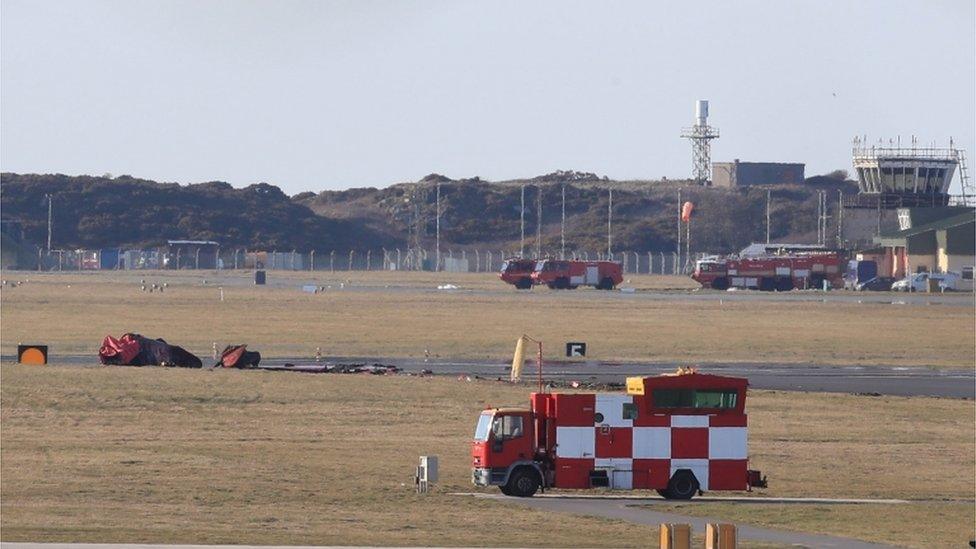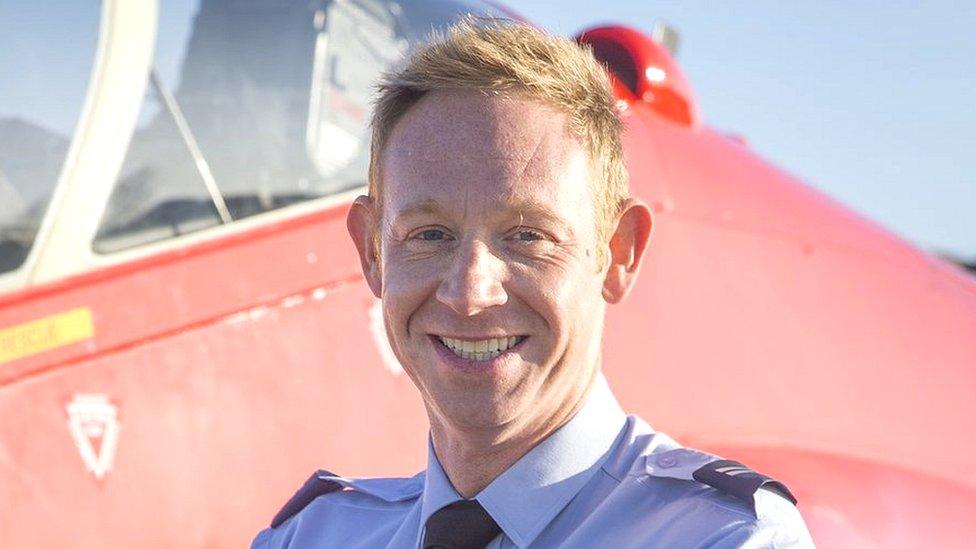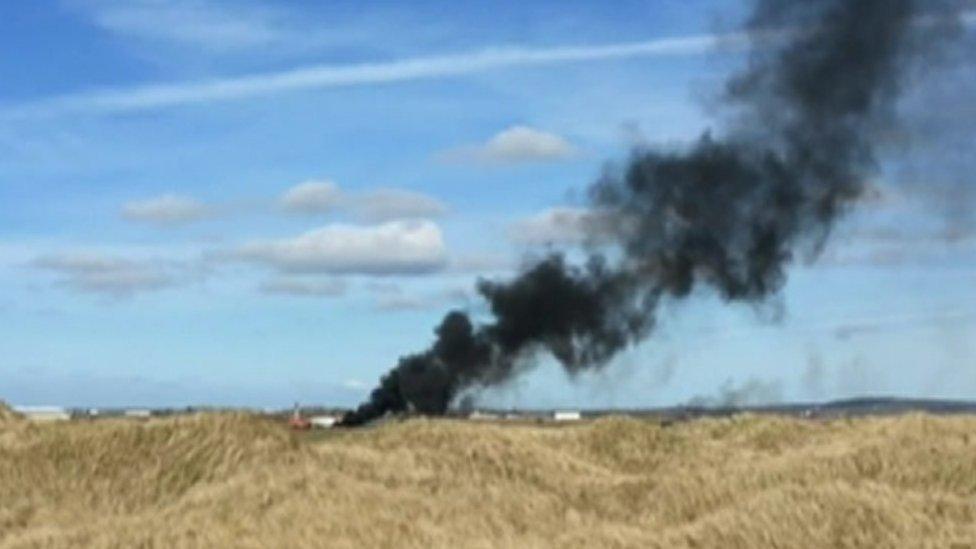Red Arrows pilot's 'sorrow' over fatal RAF Valley crash
- Published

Cpl Jonathan Bayliss joined the Red Arrows team in January 2016
A Red Arrows pilot expressed his "profound sorrow" for the death of the RAF engineer he was flying with when his jet crashed.
Flt Lt David Stark ejected to safety before the Hawk 1 jet crashed on the runway at RAF Valley, Anglesey.
Cpl Jonathan Bayliss, 41, from Ingham, Lincolnshire, died when a practice manoeuvre went wrong in March 2018.
An inquest heard the aircraft stalled before crashing.
Flt Lt Stark ejected, suffered a fractured femur and was knocked unconscious as he parachuted to the ground.
Cpl Baylis, was sitting in the back seat and died from smoke inhalation as the jet burst into a ball of flames.
Giving evidence to the inquest, with his voice breaking, Flt Lt Stark, said: "I'd like to take the opportunity to express my profound sorrow at the loss of Jon and the impact it's had on his family, Miss Pidgeon [Mr Bayliss' partner] and friends.
"I hope that this process will enable them to get some answers to what I imagine are many questions relating to the accident."
Coroner Katie Sutherland asked him if his memory of the crash had been affected by his injuries.
"I can't remember the final stages." he said. "I remember feelings related to the final stages but not data."
Flt Lt Stark told the coroner that he did not have a full memory of the actual moment he ejected from the aircraft.
He recalled starting the manoeuvre and being happy with his position and the angle of bank he was flying at and he was happy with the height at 500ft.
He said he could not clearly remember knowing that there was a problem.

Flt Lt David Stark was able to eject from the plane and survived the crash
But he added: "'This isn't normal' is more how I felt it."
He said he "didn't perceive the situation that was developing" and it was like "a flick of a switch" which told him something was wrong and "something needs to be done".
Asked about what he recalled about ejecting from the jet, Flt Lt Stark said: "I didn't say 'eject, eject'. I didn't do that.
"My recollection is that a flick of a switch happened and I recognised that I needed to eject immediately.
"I recall saying a swearing word and then I didn't say eject more than once from what I remember.
"I think my instinct at the time is that if I had said eject twice, I probably wouldn't have survived."
He said he took "no pride" in having survived. He said he had "perceived that the aircraft was going to crash and to a degree instinct took over".

The Red Arrow's display team jet crashed at RAF Valley on Anglesey in March 2018
He said it was his "eternal regret" the ejection system for both seats had not been controlled from his seat as pilot, as he could have taken Cpl Bayliss out with him.
Asked if he thought Cpl Bayliss, who was born in Dartford, Kent, would have realised the danger, he replied: "I don't think Jon could have perceived that risk."
Earlier, he was asked if he was satisfied if Jon Bayliss would have known how to operate the ejection system.
"I am satisfied that Jon would have known the practicalities of how to perform the ejection procedure and the action of pulling the ejector seat handle," Flt Lt Stark said.
Distraction claims
"What's not quantifiable is the speed at which that would be done. That's not something I can assess, nor can I perceive his seeing the need to do so without a full command to eject."
He was asked about the warning systems, or lack of them, on Hawk T 1 jets.
Flt Lt Stark said the aircraft dated from the 1970s and didn't have the same safety measures of more modern aircraft, but pilots were aware of this.
In 2019, a Service Inquiry Panel (SIP) investigation found the pilot was almost certainly fatigued and distracted during the incident.
He was asked if a call from the control tower at Valley, as he performed the ill-fated manoeuvre, had distracted him but he said his priority at the time would have been checking his position and gauges in the cock-pit.
"I have no issue with the radio call. I would hate for anyone to think that air traffic control shouldn't have made that call. I understand why they did."
The hearing continues.
Related topics
- Published2 November 2021

- Published14 May 2021

- Published10 October 2019

- Published20 March 2018

- Published19 June 2018

- Published23 March 2018
